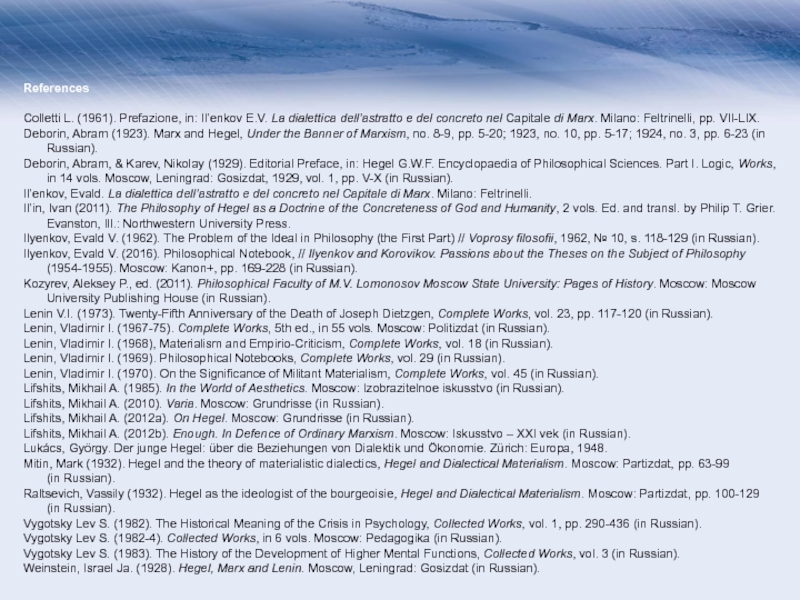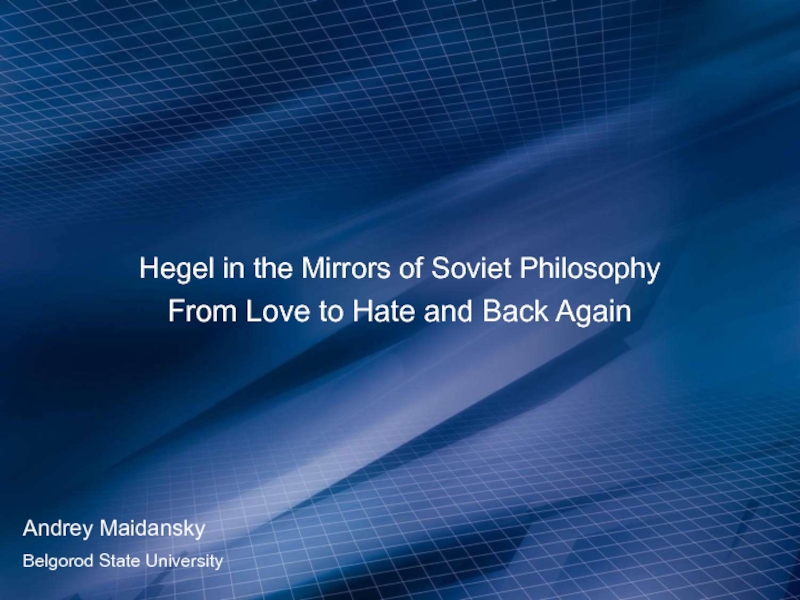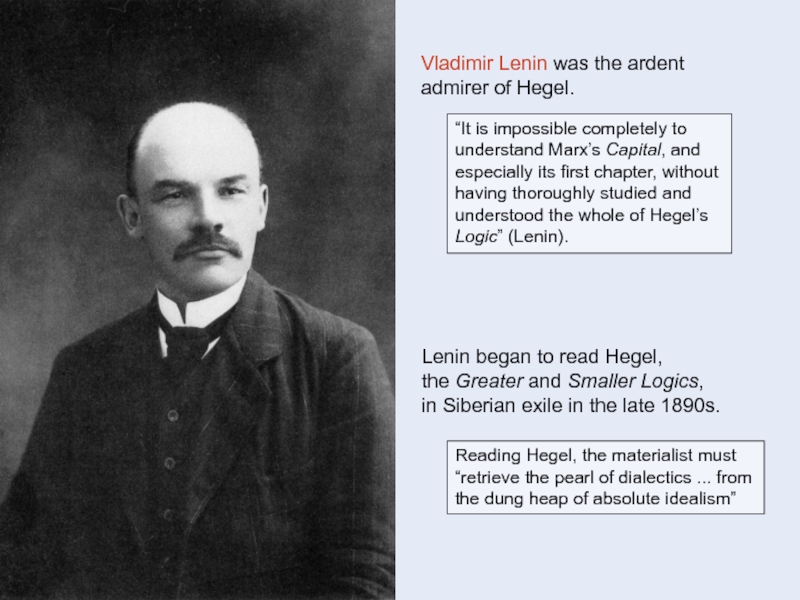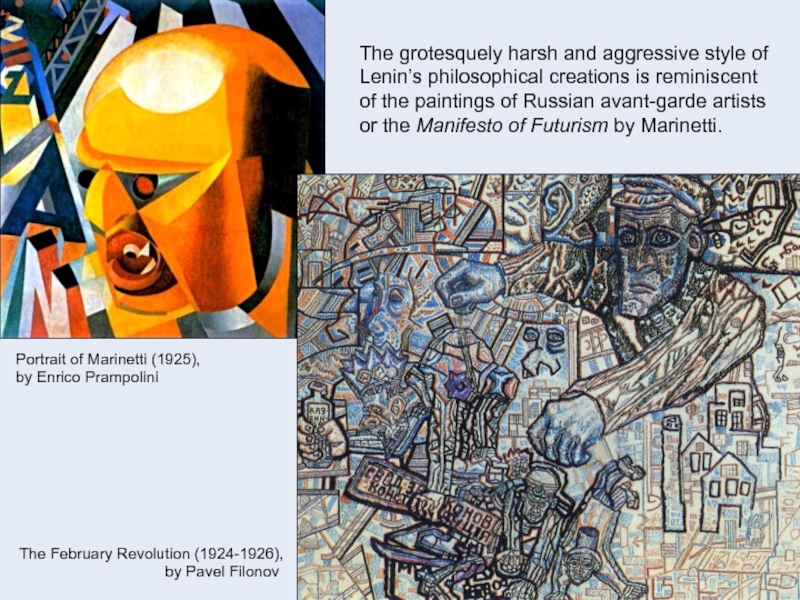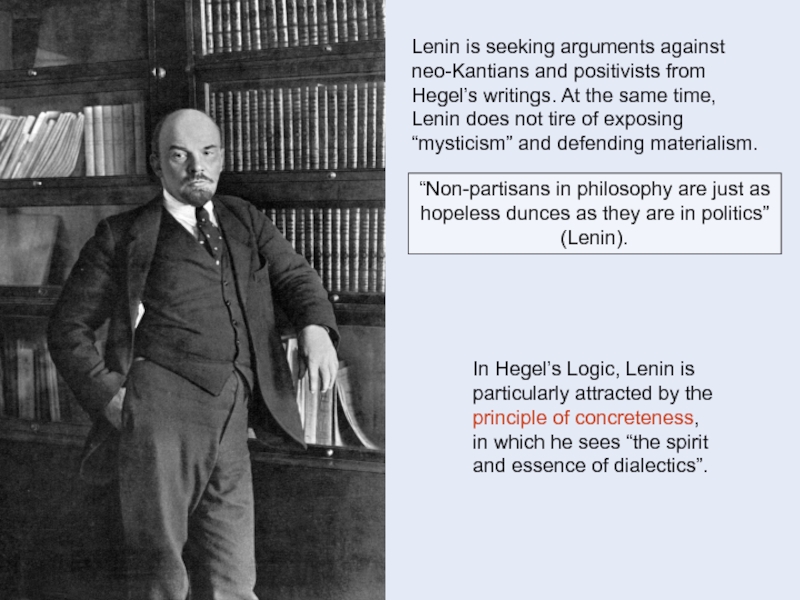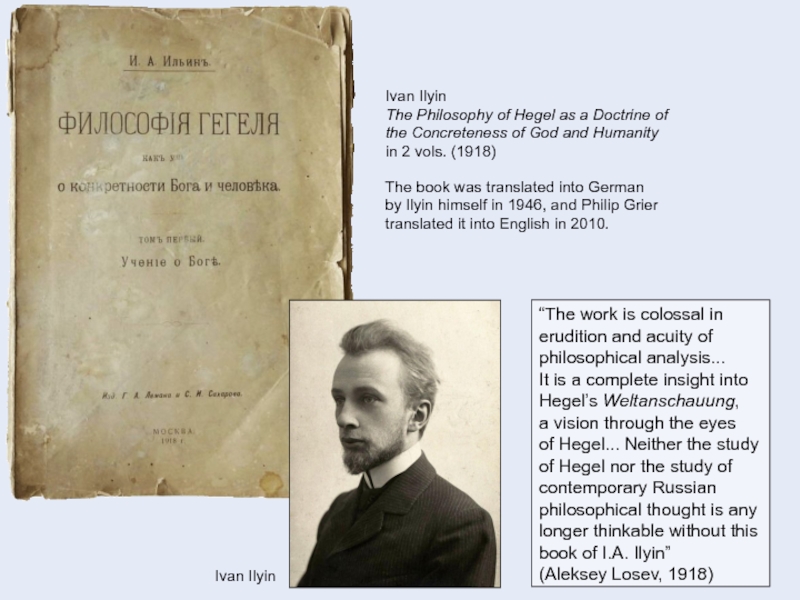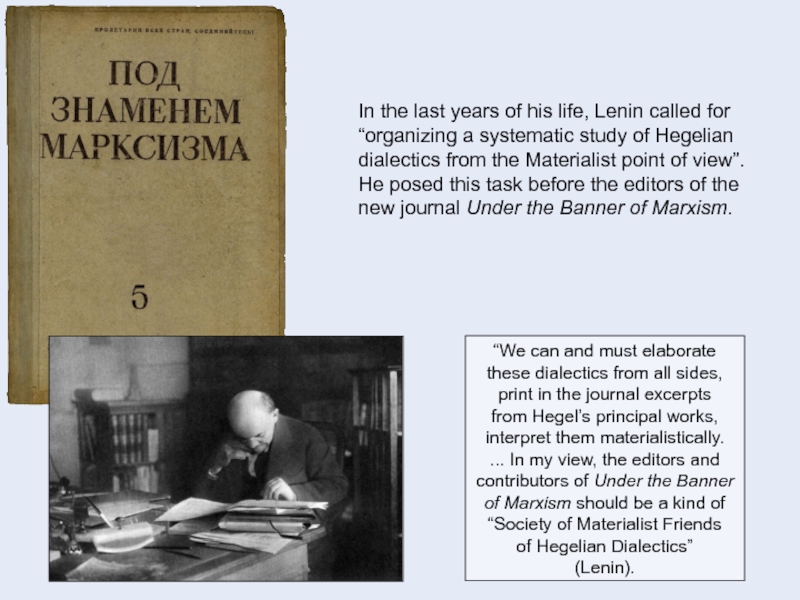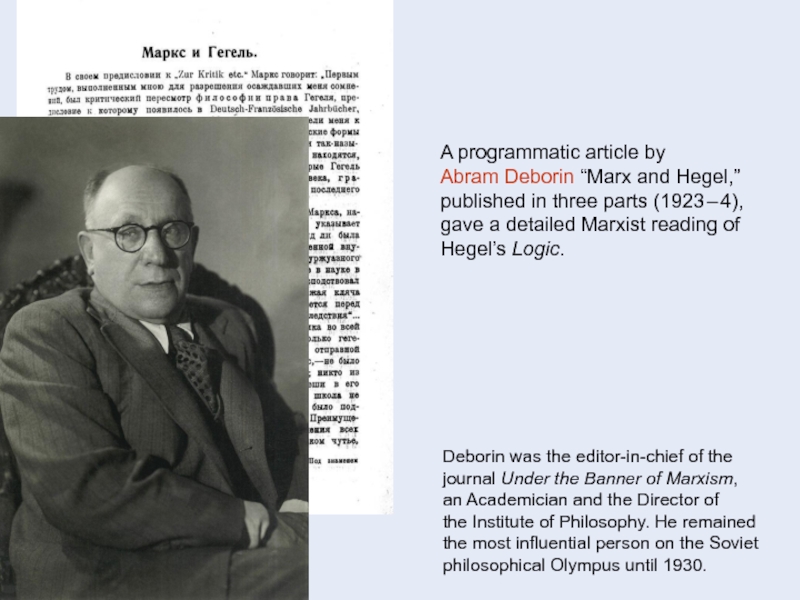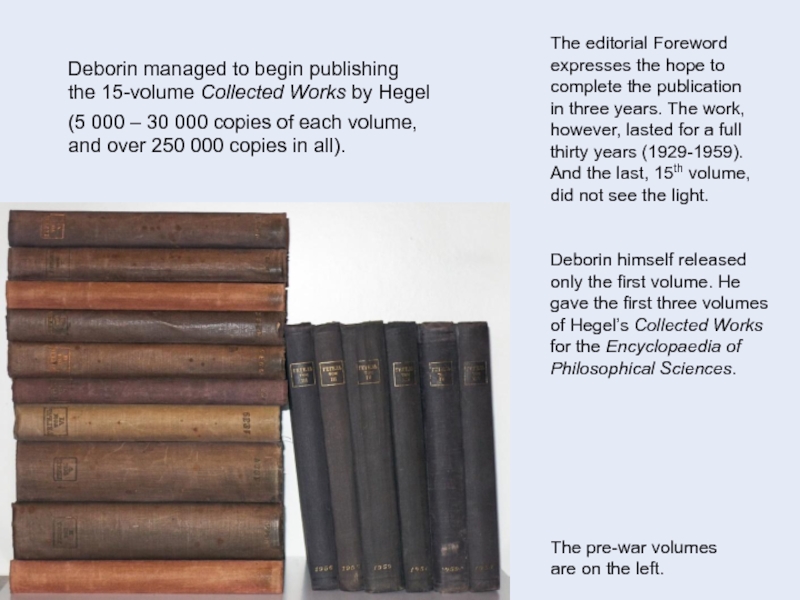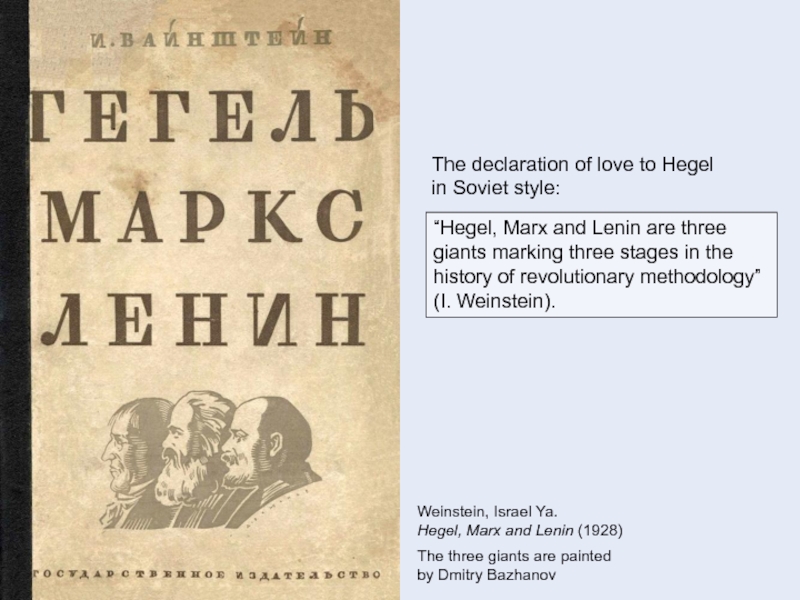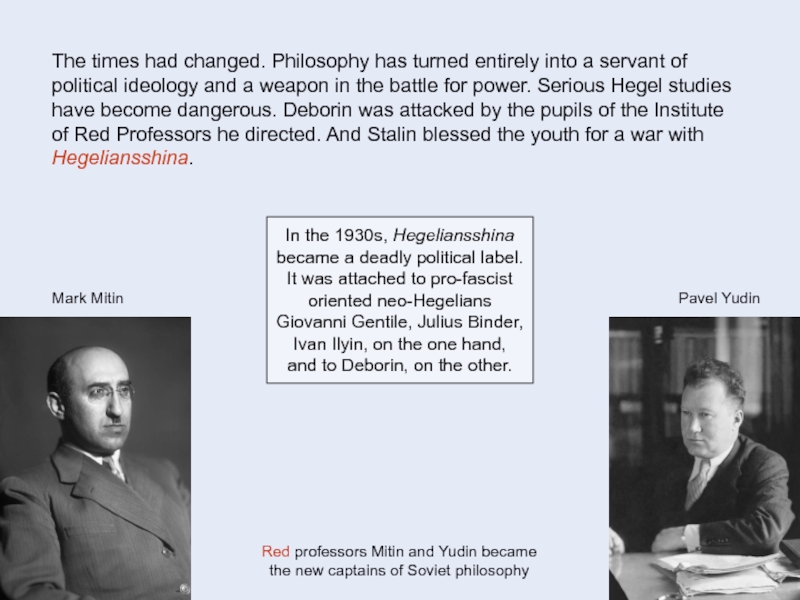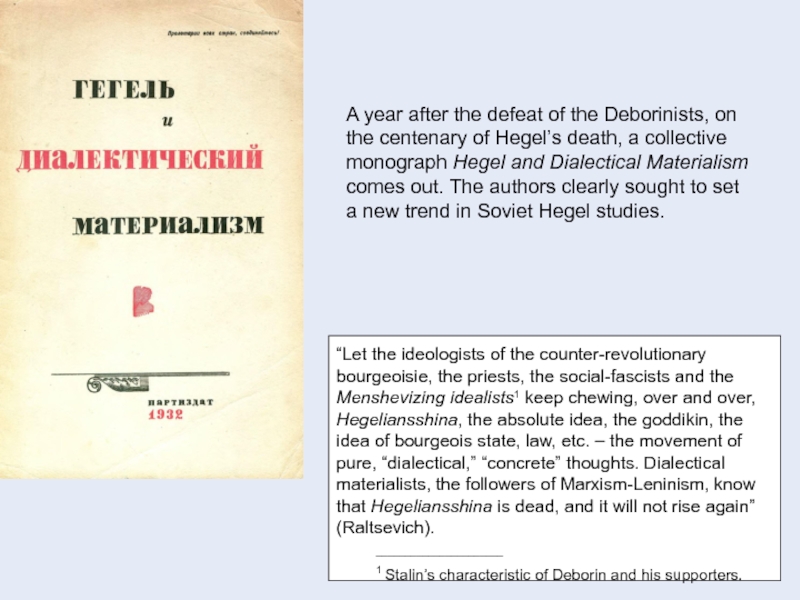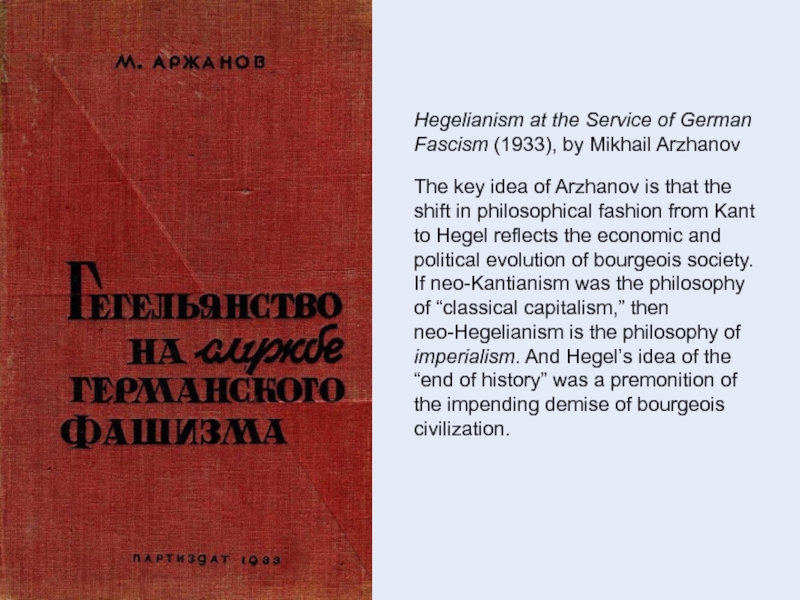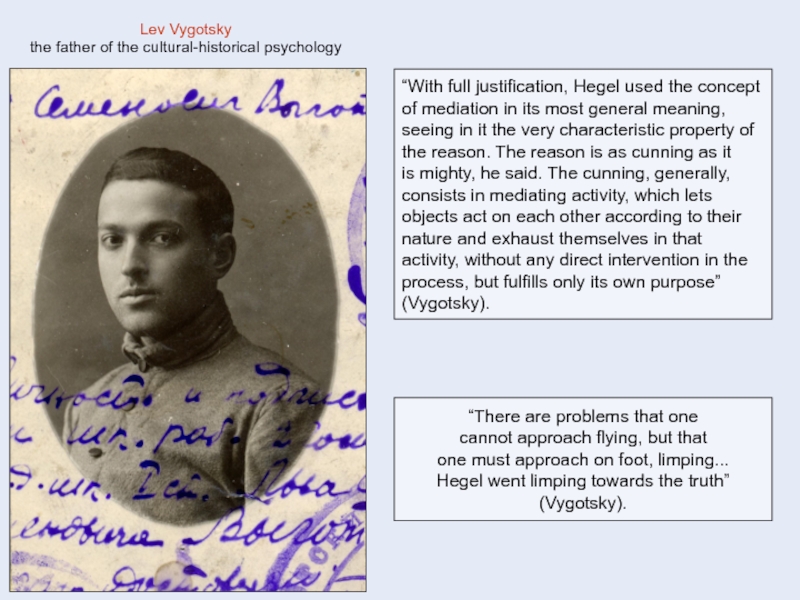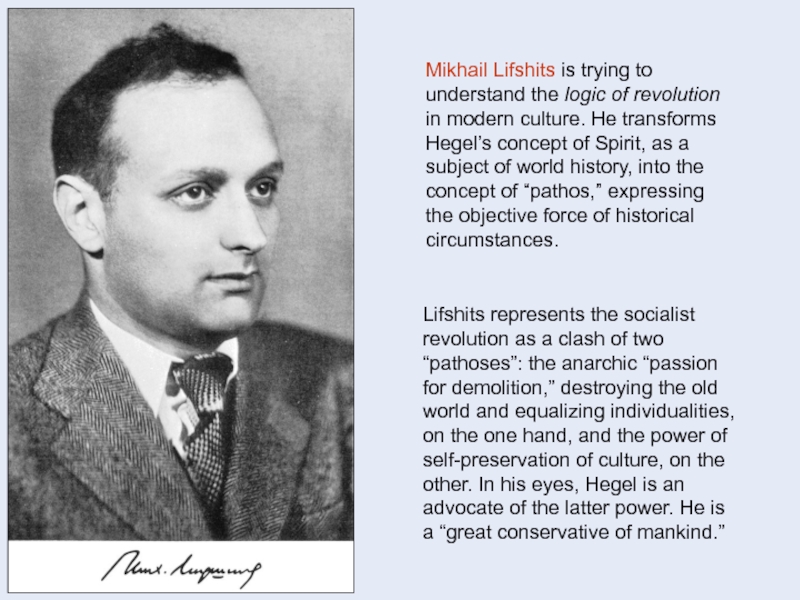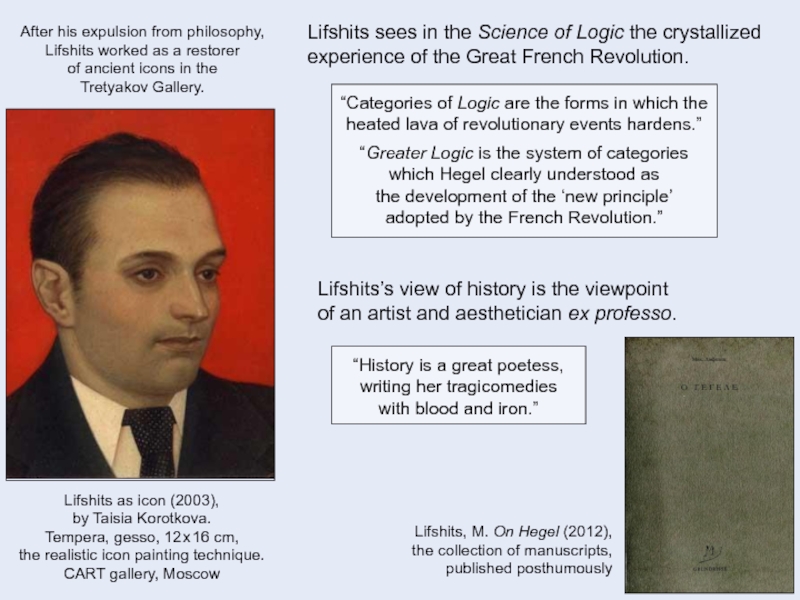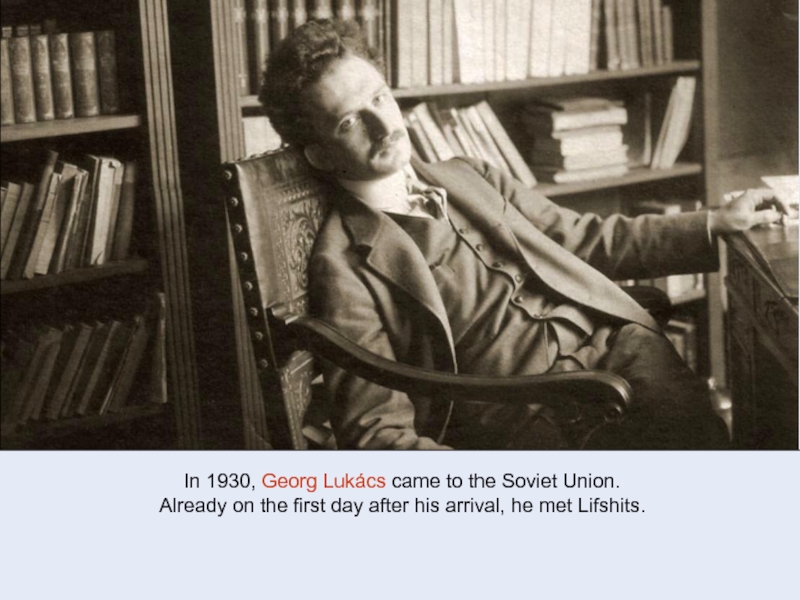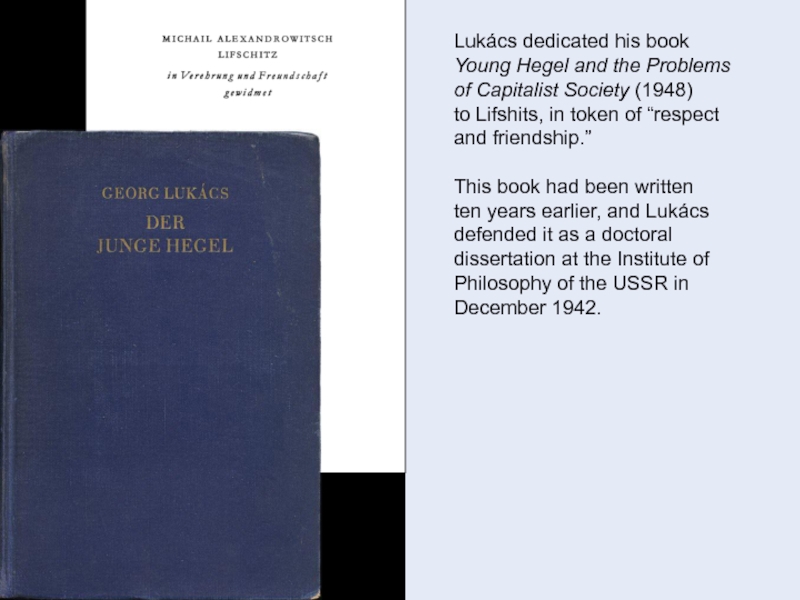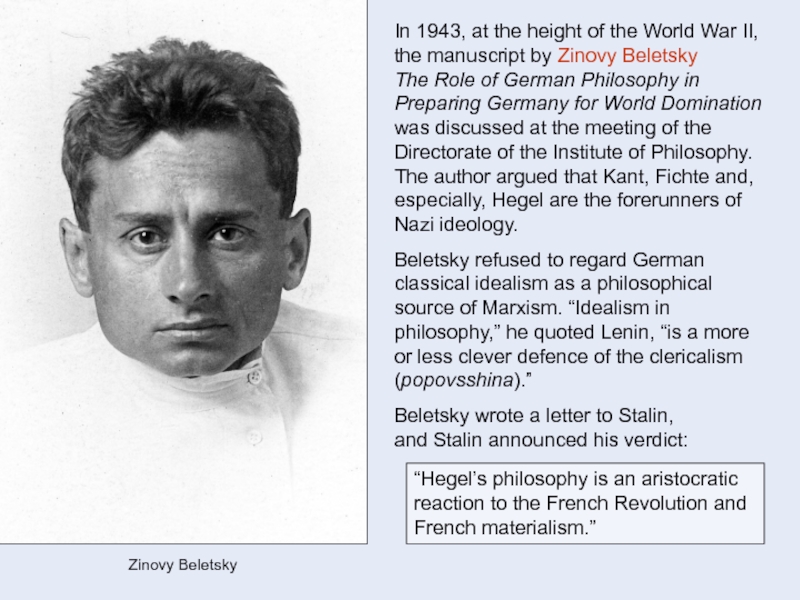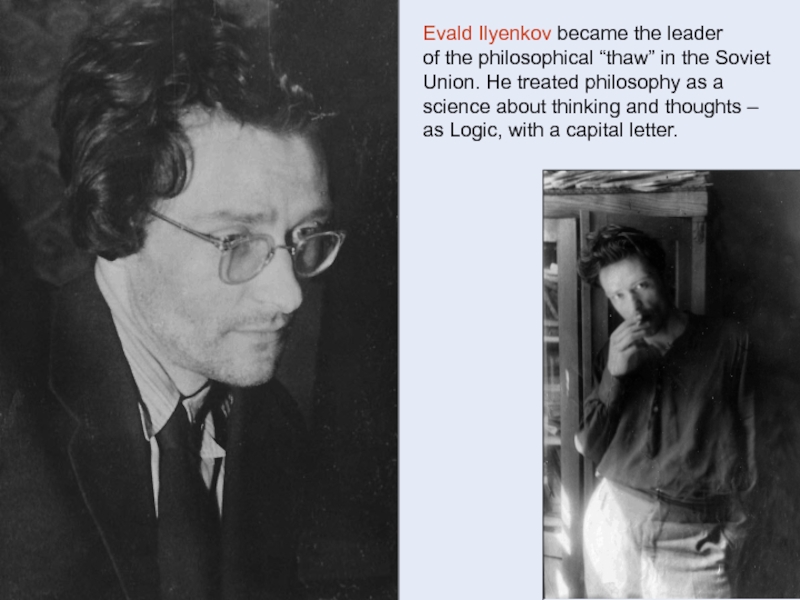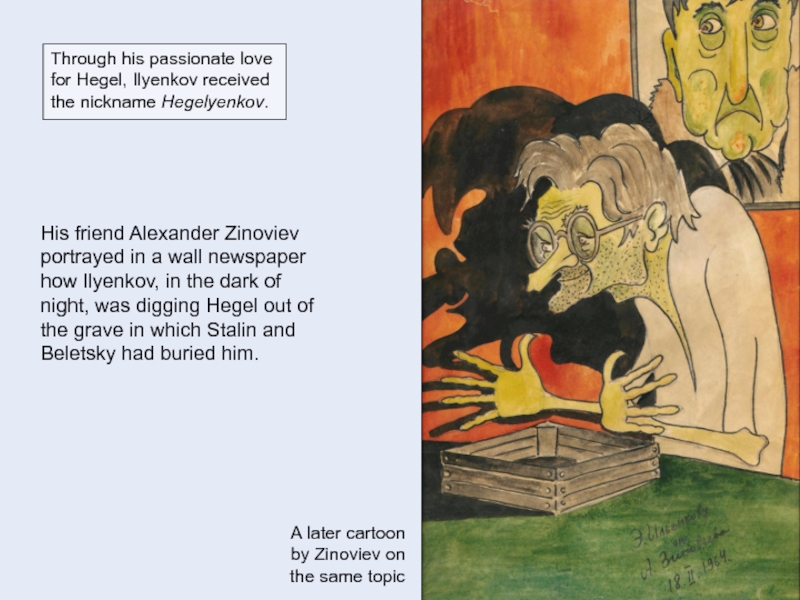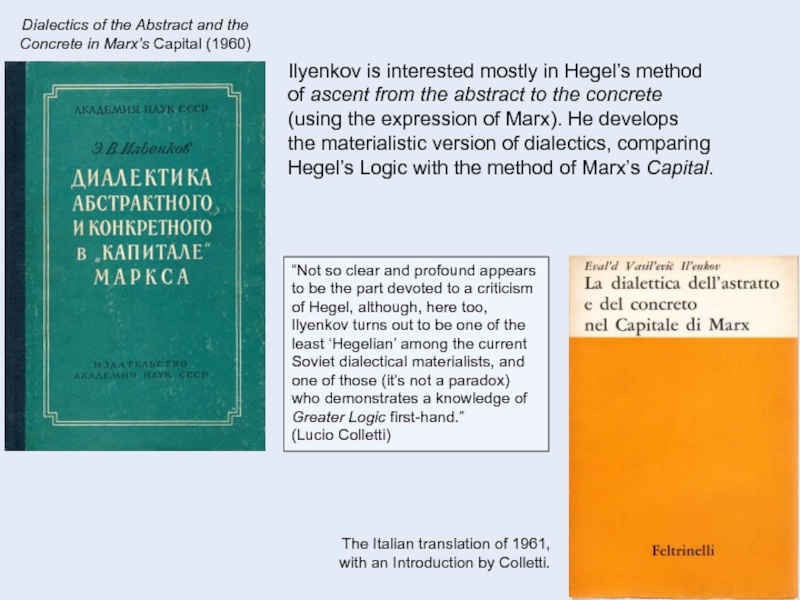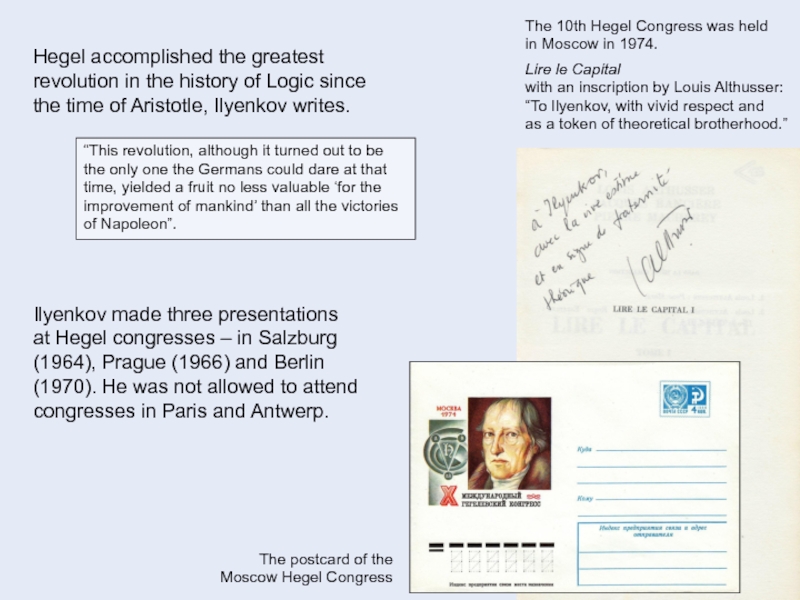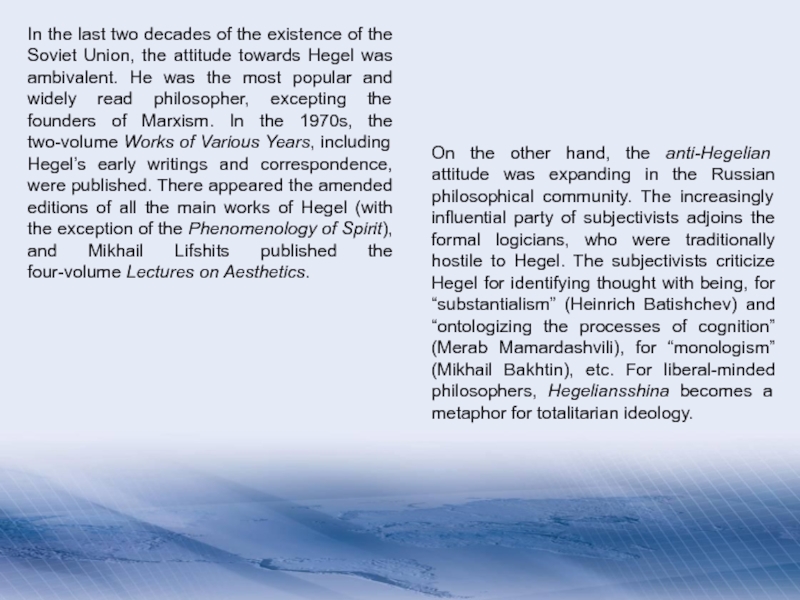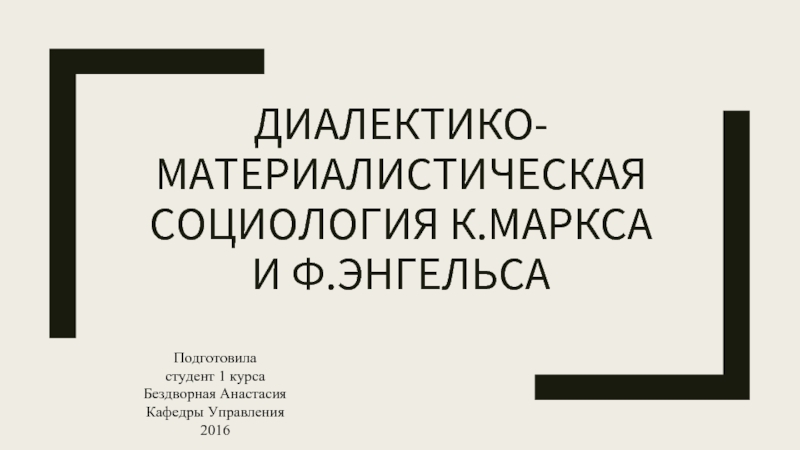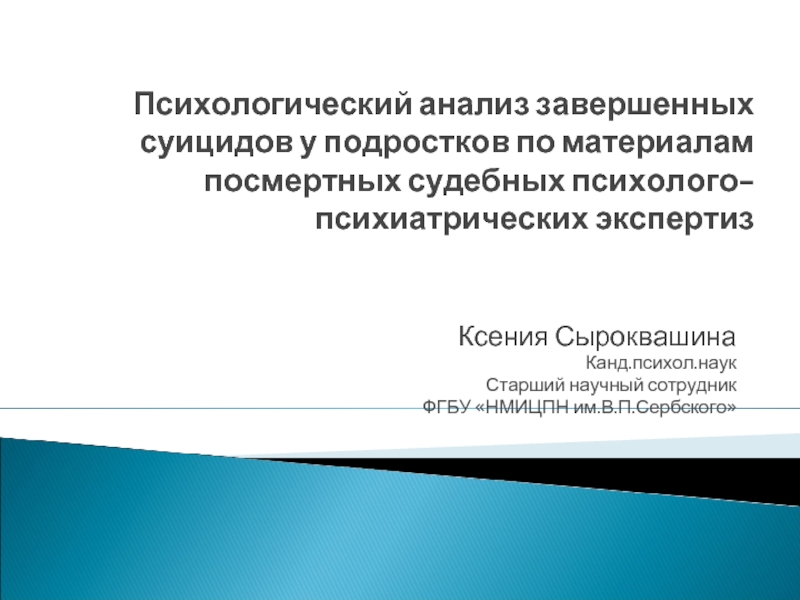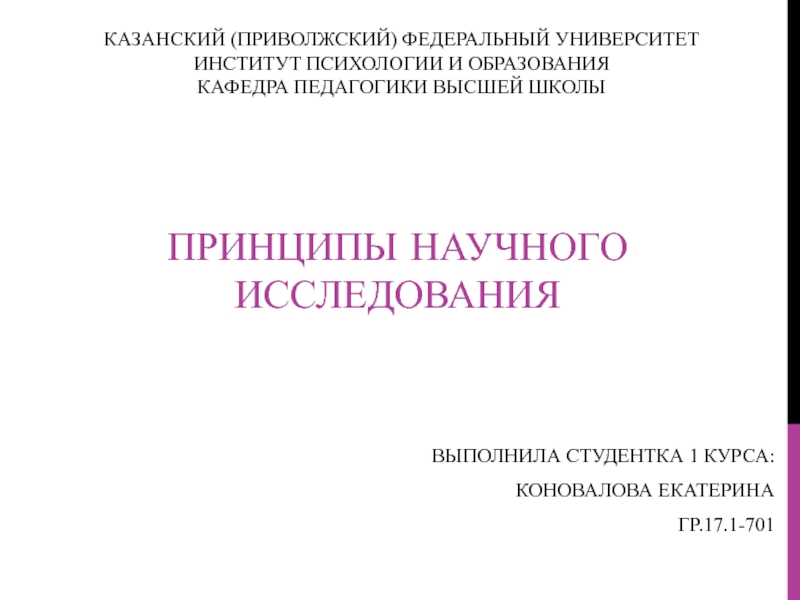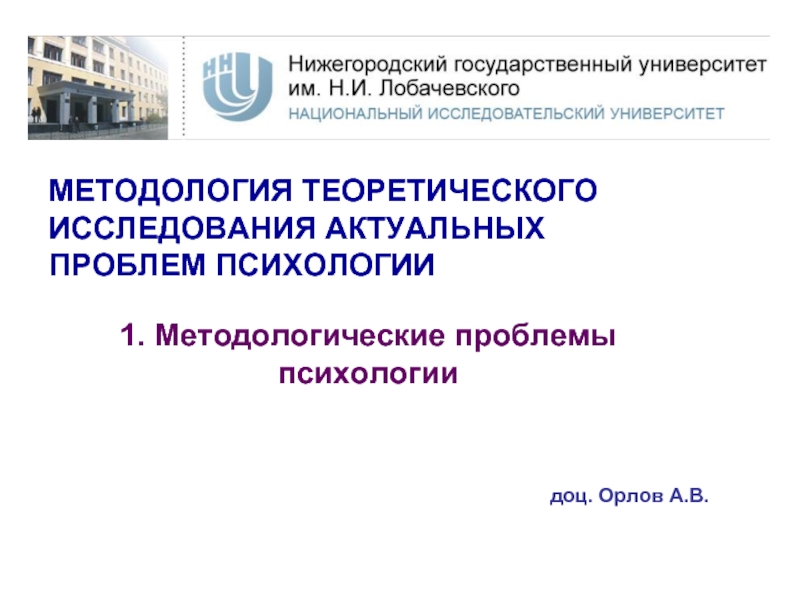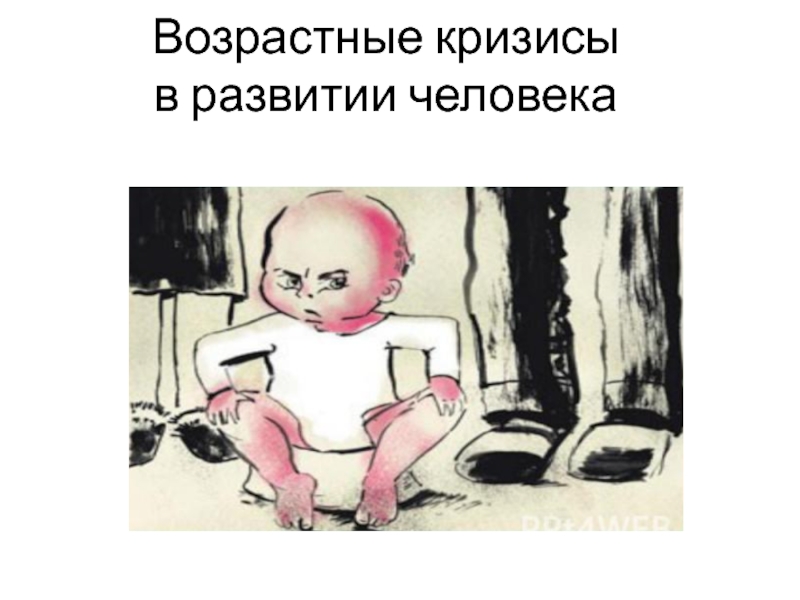Слайд 11A year after the defeat of the Deborinists, on
the centenary of
Hegel’s death, a collective monograph Hegel and Dialectical Materialism comes out. The authors clearly sought to set
a new trend in Soviet Hegel studies.
“Let the ideologists of the counter-revolutionary bourgeoisie, the priests, the social-fascists and the Menshevizing idealists1 keep chewing, over and over, Hegeliansshina, the absolute idea, the goddikin, the idea of bourgeois state, law, etc. – the movement of pure, “dialectical,” “concrete” thoughts. Dialectical materialists, the followers of Marxism-Leninism, know that Hegeliansshina is dead, and it will not rise again” (Raltsevich).
______________________
1 Stalin’s characteristic of Deborin and his supporters.
Слайд 15Lifshits as icon (2003),
by Taisia Korotkova.
Tempera, gesso, 12 x 16 cm,
the
realistic icon painting technique.
CART gallery, Moscow
Lifshits sees in the Science of Logic the crystallized experience of the Great French Revolution.
“Categories of Logic are the forms in which the
heated lava of revolutionary events hardens.”
“Greater Logic is the system of categories
which Hegel clearly understood as
the development of the ‘new principle’
adopted by the French Revolution.”
Lifshits’s view of history is the viewpoint
of an artist and aesthetician ex professo.
“History is a great poetess,
writing her tragicomedies
with blood and iron.”
Lifshits, M. On Hegel (2012),
the collection of manuscripts,
published posthumously
After his expulsion from philosophy, Lifshits worked as a restorer
of ancient icons in the
Tretyakov Gallery.
Слайд 16The tragic awareness of the imperfection of life, of the irresistible
limitation of one’s epoch, gives rise
to a philosophical resignation, Lifshits notes.
But resignation does not lead him to renounce revolutionary ideals. Lifshits condemns the
philosophical Thermidorianism of the mature Hegel,
his alleged, within an “idea,” reconciliation of
opposing social forces and interests.
“The great restoration of the truth of the old culture without retrograde ideas.”
“We can do nothing else. But if we do that, we will do all to be worthy of our role, our mission. Torn threads everywhere! ... Is Stalinsshina not a rupture of the revolutionary thread, although this thread, as has been said, implies a rupture? The gap in art, the moral gap, the gap in theoretical thought.”
His favourite motto is Restauratio Magna.
“Hegel, as depicted by Deborin and his school, was an abstractly reasoning scholastic philosopher of little interest. ... There had happened a kind of depreciation of Hegel’s philosophy, so that only a certain scheme of logical categories remained from it.
... Our interest in Hegel was of a completely different character. For us, in the teaching of the German thinker, its real content and deeply tragic attitude to the events of the French Revolution and the post-revolutionary era were important.”
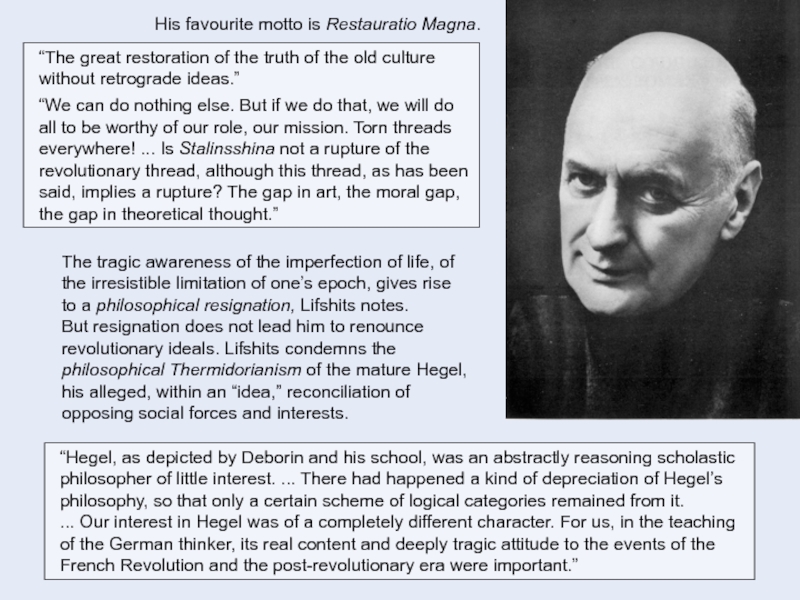
Слайд 19In 1943, at the height of the World War II, the
manuscript by Zinovy Beletsky
The Role of German Philosophy in Preparing Germany for World Domination was discussed at the meeting of the Directorate of the Institute of Philosophy.
The author argued that Kant, Fichte and, especially, Hegel are the forerunners of Nazi ideology.
Beletsky refused to regard German classical idealism as a philosophical source of Marxism. “Idealism in philosophy,” he quoted Lenin, “is a more
or less clever defence of the clericalism (popovsshina).”
Beletsky wrote a letter to Stalin,
and Stalin announced his verdict:
Zinovy Beletsky
“Hegel’s philosophy is an aristocratic reaction to the French Revolution and French materialism.”
Слайд 24In the last two decades of the existence of the Soviet
Union, the attitude towards Hegel was ambivalent. He was the most popular and widely read philosopher, excepting the founders of Marxism. In the 1970s, the two-volume Works of Various Years, including Hegel’s early writings and correspondence, were published. There appeared the amended editions of all the main works of Hegel (with the exception of the Phenomenology of Spirit), and Mikhail Lifshits published the
four-volume Lectures on Aesthetics.
On the other hand, the anti-Hegelian attitude was expanding in the Russian philosophical community. The increasingly influential party of subjectivists adjoins the formal logicians, who were traditionally hostile to Hegel. The subjectivists criticize Hegel for identifying thought with being, for “substantialism” (Heinrich Batishchev) and “ontologizing the processes of cognition” (Merab Mamardashvili), for “monologism” (Mikhail Bakhtin), etc. For liberal-minded philosophers, Hegeliansshina becomes a metaphor for totalitarian ideology.
Слайд 25References
Colletti L. (1961). Prefazione, in: Il’enkov E.V. La dialettica dell’astratto e del
concreto nel Capitale di Marx. Milano: Feltrinelli, pp. VII-LIX.
Deborin, Abram (1923). Marx and Hegel, Under the Banner of Marxism, no. 8-9, pp. 5-20; 1923, no. 10, pp. 5-17; 1924, no. 3, pp. 6-23 (in Russian).
Deborin, Abram, & Karev, Nikolay (1929). Editorial Preface, in: Hegel G.W.F. Encyclopaedia of Philosophical Sciences. Part I. Logic, Works, in 14 vols. Moscow, Leningrad: Gosizdat, 1929, vol. 1, pp. V-X (in Russian).
Il’enkov, Evald. La dialettica dell’astratto e del concreto nel Capitale di Marx. Milano: Feltrinelli.
Il’in, Ivan (2011). The Philosophy of Hegel as a Doctrine of the Concreteness of God and Humanity, 2 vols. Ed. and transl. by Philip T. Grier. Evanston, Ill.: Northwestern University Press.
Ilyenkov, Evald V. (1962). The Problem of the Ideal in Philosophy (the First Part) // Voprosy filosofii, 1962, № 10, s. 118-129 (in Russian).
Ilyenkov, Evald V. (2016). Philosophical Notebook, // Ilyenkov and Korovikov. Passions about the Theses on the Subject of Philosophy (1954-1955). Moscow: Kanon+, pp. 169-228 (in Russian).
Kozyrev, Aleksey P., ed. (2011). Philosophical Faculty of M.V. Lomonosov Moscow State University: Pages of History. Moscow: Moscow University Publishing House (in Russian).
Lenin V.I. (1973). Twenty-Fifth Anniversary of the Death of Joseph Dietzgen, Complete Works, vol. 23, pp. 117-120 (in Russian).
Lenin, Vladimir I. (1967-75). Complete Works, 5th ed., in 55 vols. Moscow: Politizdat (in Russian).
Lenin, Vladimir I. (1968), Materialism and Empirio-Criticism, Complete Works, vol. 18 (in Russian).
Lenin, Vladimir I. (1969). Philosophical Notebooks, Complete Works, vol. 29 (in Russian).
Lenin, Vladimir I. (1970). On the Significance of Militant Materialism, Complete Works, vol. 45 (in Russian).
Lifshits, Mikhail A. (1985). In the World of Aesthetics. Moscow: Izobrazitelnoe iskusstvo (in Russian).
Lifshits, Mikhail A. (2010). Varia. Moscow: Grundrisse (in Russian).
Lifshits, Mikhail A. (2012a). On Hegel. Moscow: Grundrisse (in Russian).
Lifshits, Mikhail A. (2012b). Enough. In Defence of Ordinary Marxism. Moscow: Iskusstvo – XXI vek (in Russian).
Lukács, György. Der junge Hegel: über die Beziehungen von Dialektik und Ökonomie. Zürich: Europa, 1948.
Mitin, Mark (1932). Hegel and the theory of materialistic dialectics, Hegel and Dialectical Materialism. Moscow: Partizdat, pp. 63-99
(in Russian).
Raltsevich, Vassily (1932). Hegel as the ideologist of the bourgeoisie, Hegel and Dialectical Materialism. Moscow: Partizdat, pp. 100-129
(in Russian).
Vygotsky Lev S. (1982). The Historical Meaning of the Crisis in Psychology, Collected Works, vol. 1, pp. 290-436 (in Russian).
Vygotsky Lev S. (1982-4). Collected Works, in 6 vols. Moscow: Pedagogika (in Russian).
Vygotsky Lev S. (1983). The History of the Development of Higher Mental Functions, Collected Works, vol. 3 (in Russian).
Weinstein, Israel Ja. (1928). Hegel, Marx and Lenin. Moscow, Leningrad: Gosizdat (in Russian).
